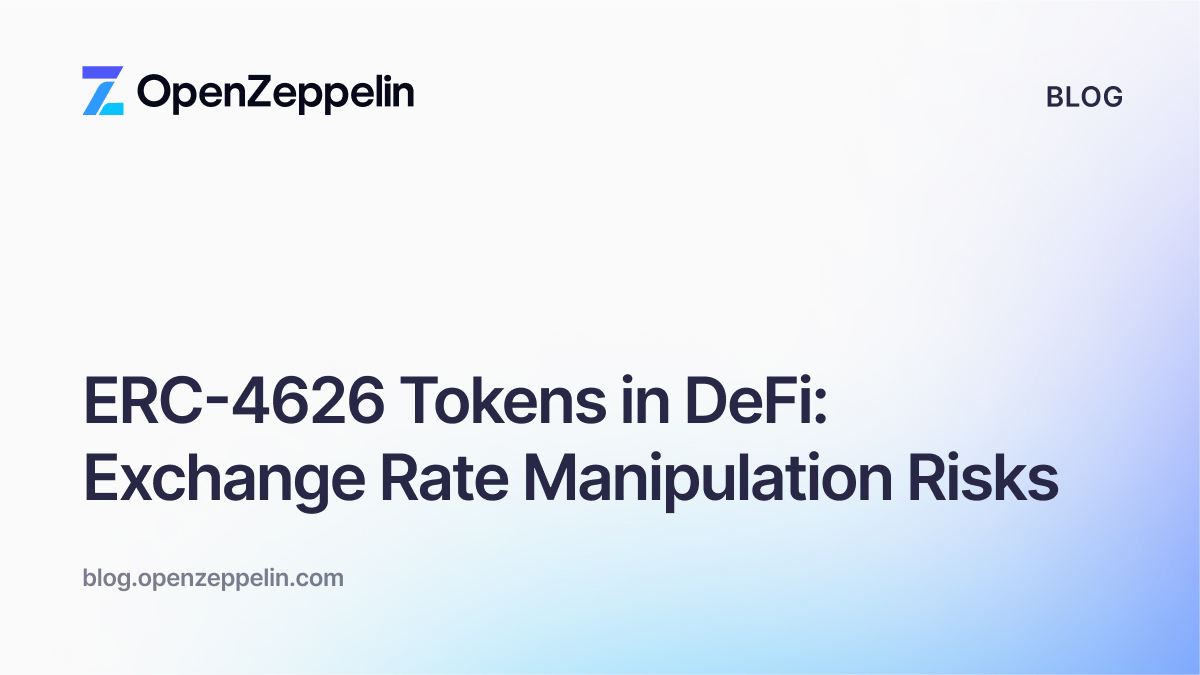The OTOY team asked us to review and audit their RNDR Token contracts. We looked at the code and now publish our results.
The audited code is located in the Token-Audit and the Token-Airdrop repositories. The versions used for this report are commits e946177747e57312690775204834b8fca1bbb0d5 and d96202acf6fb5d0305368bac36aa960d455cbffe respectively.
Disclaimer:_ While the RNDR Token incorporates a migration strategy from a legacy token, we were not provided with the code of the token to be migrated, so this audit does not cover potential security issues associated with the intended migration. A new security audit is advised when the live migration is to be performed, for which it is suggested to use the coming version 2.0 of ZeppelinOS.
Here is our assessment and recommendations, in order of importance.
Update: The OTOY team made some fixes based on our recommendations on commits bad2e4d0c283a1fa75840806a7026869dab057ad and 0d71bb89d20a192453614c80be815880b2ef3eac of the Token-Audit and the Token-Airdrop repositories respectively. The updates in the issues below refer to these new commits.
Critical Severity
None.
High Severity
The Escrow’s owner can arbitrarily increase the balance of any job without spending RNDR tokens
In theEscrow contract, the address of the associated token contract is tracked by the renderTokenAddress variable. The owner of the Escrow is allowed to change this variable at any time by calling changeRenderTokenAddress. If the owner called changeRenderTokenAddress passing the address of an account controlled by them as a parameter, they would therefore be allowed to call fundJob from that account and arbitrarily increase any job balance, at any point in time, without spending any tokens.
Consider analyzing the removal of the changeRenderTokenAddress function, or at least properly documenting the rationale behind its inclusion in the contract, so users are aware of such a dangerous scenario. While an attempt to do so was found in Escrow.sol , where a comment states that the function “[…] is included as a failsafe”, the issues that this mechanism would prevent from occurring are never explained.
Update: an event is now emitted when the changeRenderTokenAddress function is called, and documentation was added explaining the rationale for having this function.
Unsafe arithmetic operations in Airdrop contract
The Airdrop contract contains a series of arithmetic operations which are not being addressed with caution (in lines 30 , 39 , 56 , 58 , 64 and 65 ) , leading to attempts to store numbers outside the range of the data types of their target variables. There are in particular two situations which could potentially cause integer overflows/underflows.
The first case is related to an assignment to a storage variable inside a loop in the addManyUsers function. This function iterates through a _recipientsarray of addresses and a paired _amounts array of uint256‘s. In each iteration, the function addUser is called, which adds the respective user amount to the storage variable totalBonus, in charge of accumulating the sum. For an extremely large list of users and amounts, the variable totalBonus may reach its maximum possible value and finally overflow (i.e. start again from 0). In this scenario, an inconsistency between the total bonus sum and each user’s bonus amount would be reached.
In the second case, an unsafe math operation in the payManyUsers function could lead to an integer underflow. After the contract is deployed, the storage variable nextUserToBePaid equals 0. When calling payManyUsers , if 0 was passed as the value of the batchSize variable (or the function was externally called without parameters) , the unsigned variable idTo would be assigned the result of the operation 0 + 0 – 1, resulting in an underflow and a stored value of 2²⁵⁶ – – While in this case the immediately followin if clause would prevent something unexpected to happen, this approach is error-prone and not advised.
Consider using OpenZeppelin’s SafeMath library to avoid underflows/overflows when doing mathematical operations.
Update: the SafeMath library is now being used throughout.
Contract owners can change business logic unnoticeably
In several contracts, the owner can arbitrarily change the business logic by setting new contract addresses, without properly warning users of those changes. Examples are:
RenderToken#setEscrowContractAddress:the address that will hold tokens in escrow and keep a ledger of funds available for jobs.Escrow#changeRenderTokenAddress: the address of the token contract.Escrow#changeDisbursalAddress: the address authorized to distribute tokens for completed jobs.
Consider emitting events to notify users about any modifications of such importance in the contracts’ business logic.
Update: events are now emitted to provide users with a mechanism to track these changes.
Inconsistent and experimental use of Solidity versions
Across the audited contracts, several versions of the Solidity compiler are used: ^0.4.18 in Escrow, ^0.4.14 in RenderToken, ^0.4.21 in the migration example contracts LegacyToken and MigratableERC20, and ^0.4.0in Airdrop, which also uses the pragma#experimental “v0.5.0”.
While the individual contracts can be compiled using different versions of the Solidity compiler, profuse versioning among the same codebase is confusing and error-prone. As indicated by its name, the experimental feature should not be used in production.
Consider using the latest (0.4.25 at the time of writing) version of the Solidity compiler throughout the code.
Update: Solidity version v0.4.24 is now used throughout the project.
Medium Severity
Two different minting functions coexist in the RenderToken contract
As per the disclaimer in the header, we haven’t been able to assess the migration strategy for not having been provided with the code corresponding to the legacy contract to be migrated. Instead, the LegacyToken.sol and MigratableERC20.sol files were extracted from an example provided as a guide in an early version of ZeppelinOS. This guide explains how to migrate old token balances by burning old and minting new tokens, for which it introduced a _mint function in the new token, which extended StandardToken from openzeppelin-zos (now renamed to openzeppelin-eth).
Apart from the two copied files that function as placeholder, the RenderToken contract implements the _mint function that is declared in MigratableERC20, from which it extends. However, RenderToken also extends from openzeppelin-zos‘s MintableToken , which already has a minting function named mint. Duplicating the minting functionality is confusing and potentially dangerous. Whichever form the migration ends up taking, consider using the already existing mint function for it.
Update: The RenderToken contract now extends from openzeppelin-eth'sStandardToken instead of MintableToken, and there is now a single minting function called _mintMigratedTokens.
Input arrays with mismatched length will make addManyUsers throw
The addManyUsers function in the AirDrop contract, in charge of registering the _recipients of the airdrop and their respective bonus _amounts, simultaneously iterates over both arrays based on the length of just one of them (_recipients). If the number of elements in _amounts is less than that in _recipients, the whole transaction will be reverted for attempting to access an out-of-bounds index.
Consider including a require clause with an explicit error message to check for matching array length.
Update: a require statement now checks for matching array length.
Omission of the transfer in disburseJob leads to inconsistent balance state
The RenderToken contract interacts with the Escrow contract by funding jobs, transferring tokens to increase the different jobs’ balances, which are tracked by the Escrow. The disburseJob function later takes care of redistributing these funds among the recipients.
This function, however, does not actually transfer the tokens to the recipients, but simply sets an allowance, which the recipients can then use to transfer the tokens themselves. While there is merit in using a pattern where the beneficiaries are in charge of withdrawing their funds, the disburseJobfunction will leave the Escrow in an inconsistent state where the sum of the total jobBalances is different from its total token balance, since the former are depleted by the function but the latter isn’t.
Even if the jobBalances mapping cannot be traversed to get the total balance without an external listing of jobs, consider implementing the Escrowbalance tracking in a way that doesn’t lead to inconsistencies, or using the PullPayment/Escrow solution provided in the OpenZeppelin suite.
Update: the disburseJob function now performs the token transfers.
payUser fails silently if the bonus was already paid
In the payUser function of the AirDrop contract, an if clause is used to check whether a bonus has already been paid. In the case the condition amount > 0 is not satisfied, the payment will not be performed, giving the caller no notice that it didn’t go through apart from the lack of an associated event.
Consider complementing the if with an else clause that handles the logic when the condition fails.
Update: an event is now emitted in case the if condition fails.
Unchecked ERC20 transfer operation
Inside the payUser function, a transfer is being made but there are no checks validating its successful completion. If the transfer somehow fails, an event logging the successful operation would be emitted despite the transferee not getting their tokens.
Consider using OpenZeppelin’s SafeERC20 library and its safeTransfer function, or surrounding the transfer operation with a require statement.
Update: the SafeERC20 library is now used.
Missing checks for null addresses in RenderToken and Airdrop contracts
In RenderToken, the setEscrowContractAddress function allows the token’s owner to change the escrow’s address (i.e. the contract variable escrowContractAddress ). However, the function does not implement a check to prevent the null address from being set.
Similarly in Airdrop, the contract’s constructor receives as a parameter an address that is assigned to the contract variable renderTokenAddress with no checks preventing the null address from being used.
Consider implementing no-null address validations before setting these variables to avoid potential problems downstream.
Update: null checks are now [in(https://github.com/jeualvarez/Token-Audit/blob/master/contracts/RenderToken.sol#L88) place for address changes.
Storage modification on event emission
In the addUser function of the Airdrop contract, an item is pushed into the bonusAddresses array. The result of the operation, which is the length for that array after the addition, is used as a parameter in the AddedUser event emission. This, while valid Solidity, is confusing and error-prone.
Consider performing the storage modification and keeping the resulting value in a temporary variable before emitting the event for code clarity.
Update: the temporary value is now assigned to a variable before emitting the event.
Low Severity
Event parameters are not indexed
The AddedUser and PaidUser events defined in Airdrop as well as the JobBalanceUpdate event defined in Escrow are not indexing their parameters. This means that they will not be searchable in terms of those variables, making it impossible to track job balance histories, user additions or payments.
In case these are to be tracked, consider adding the indexed keyword to at least the userAddress variables in the AddedUser and PaidUser events, and the _jobId variable in the JobBalanceUpdate event.
Update: the AddUser and PaidUser events now index their parameters, but the JobBalanceUpdate one still doesn’t. String indexing had an associated [web3(https://github.com/ethereum/web3.js/issues/434#issuecomment-321526814) issue , which is purportedly solved in version 1.0. Alternatively, two workarounds for this issue are discussed here.
Deceptive inline comment in Escrow contract
Considering the issue “The Escrow’s owner can arbitrarily increase the balance of any job without spending RNDR tokens” above, the comment in Escrow.sol that states: “Jobs can only be created through the RNDR contract” is false and may be misleading for users reading the contract’s code. Consider rephrasing it clearly to state that job balances can be arbitrarily incremented by whatever account the owner of the contract sets as the renderTokenAddress.
Update: the comment was fixed to read: “Jobs can only be created by the address stored in the renderTokenAddress variable ”.
Missing error messages in require statements
There are several require statements (such as Escrow :L70 , Escrow :L89 , Escrow :L109 , RenderToken :L40 , RenderToken :L45 ) that provide no error messages. Consider including specific and informative error messages in all require statements.
Update: all require statements now provide appropriate error messages.
Missing docstrings in contract and functions in Airdrop contract
TheAirDrop contract’s source code, which handles token distribution, has no inline documentation whatsoever. Consider documenting with docstrings everything that is part of the public API.
Update: the AirDrop contract is now thoroughly documented.
Untested functions in RenderToken
The RenderToken contract implements functions (e.g. holdInEscrow ) that are not being tested in the test suite. Consider testing all functions implemented in contracts to ensure they behave as expected.
Update: some testing of holdInEscrow was done in the Escrow.js file, but an additional test for this function was added to the RenderToken.js file.
Broken testing instructions in README files
Instructions in Token-Audit/README.md file do not work if followed literally. An error “Cannot find ./config module” is thrown while running npm test. Instructions in Token-Airdrop/README.md file also do not work, with the error “Could not find artifacts for Airdrop from any sources” thrown while running truffle test. These errors might arise from differences in casing: the name of the contract in the Airdrop.sol file is AirDrop, but the artifact being required is Airdrop. This in turn might be due to the fact that in OS X, strings are case-insensitive. While this works on Mac’s filesystems, it can lead to setup errors when working across different operating systems.
Consider updating the instructions and including a working cross-platform configuration so developers and auditors can successfully run the test suite. Furthermore, given that the test suite for the Airdrop contract can only be run using thetruffle v5.0.0-beta release, consider including this version of truffle as a dev dependency in the package.json file of the project.
Update: the README files were updated with new testing instructions.
Erroneous documentation in initialize functions
Initialize functions (in Escrow and RenderToken ) are incorrectly documented, since these functions are not contract constructors. Consider updating the inline documentation to fix these errors.
Update: documentation now refers to the functions as initializers instead of constructors.
Inconsistent use of imports in contracts
The use of imports in contracts is not consistent throughout the codebase. There are missing explicit imports (e.g. missing imports for Migratable and Ownable in Escrow.sol, and for MintableToken in RenderToken.sol). Consider explicitly importing all necessary contracts in each contract throughout the codebase to improve code consistency and legibility.
Update: all imports use now a consistent style.
Inconsistent coding style among different files
There is a significant coding-style difference between the contracts in the Token-Audit repository and those in Token-Airdrop repository. The contracts in the first one use docstrings, libraries like OpenZeppelin’s SafeMath , and 2-space indentation. The latter, on the other hand, has no comments in the source code nor takes security considerations into account by using already audited libraries, and uses 4-space indentation. Consider following best practices and applying the same style guidelines across all files.
Update: both repositories use now a consistent coding style.
Notes & Additional Information
- The addresses of job funders are presumably meant to be tracked off-chain, but consider adding an event-based tracking layer as a failsafe (i.e., _emitting an event identifying the contributor in
RenderToken‘sholdInEscrowfunction).
_Update: an event is now emitted. - In the
Airdropcontract, consider prefixing all internal functions with an underscore to clearly denote their visibility.
Update: internal functions are now prefixed with an underscore. - Several public functions can be restricted to external. In particular: functions
fundJob,changeDisbursalAddress,changeRenderTokenAddress,disburseJob, andjobBalancein theEscrowcontract, and functionsaddManyUsers,payManyUsers,finalizeList,returnTokensandgetUserCountin theAirDropcontract.
Update: these functions were restricted to external. - Consider including brackets in all control flow statements (e.g. in
Airdrop.sol) , to prevent issues with future versions of the language.
Update: brackets were added. - Consider declaring the
canDisbursemodifier before all function definitions.
Update: the modifier was moved before all functions. - Consider making all instances of
uintexplicitlyuint256(seeEscrow.sol:L72 andAirdrop.sol:L47 ).
Update: alluinttypes are now explicitlyuint256. - Variables
listFinalizedandnextUserToBePaidare explicitly initialized inAirDrop, buttotalBonusis not. Consider initializing this last variable explicitly as well for code consistency.
Update:totalBonusis now initialized. - Consider explicitly marking all contract variables as private and defining getters/setters where appropriate, or at least explicit setting the visibility of all contract variables (e.g.
jobBalancesin theEscrowcontract is not declared as public).
_Update:jobBalancesis now declared asprivate. - In order to load the
Airdropcontract to execute the payments, it is necessary that someone with minting privileges or enough tokens adds balance from aRenderTokencontract to the address of the recently deployedAirdropcontract. For clarity purposes, consider expanding step number five on the instructions inToken-Airdrop/README.mdfile to clearly state this precondition.
Update: theREADMEfile has updated wording on this point.
Conclusion
No critical and four high severity issues were found. Some changes were proposed to follow best practices and reduce the potential attack surface.
Note that as of the date of publishing, the above review reflects the current understanding of known security patterns as they relate to the OTOY RNDR Token contracts. The above should not be construed as investment advice. For general information about smart contract security, check out our thoughts here.


